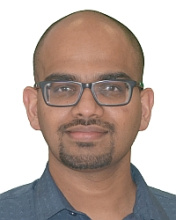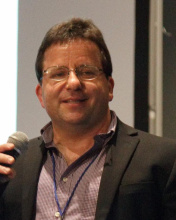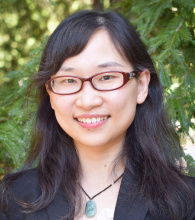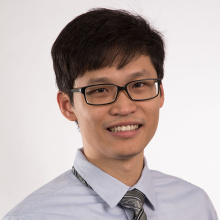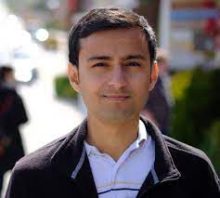CPS Events
Motion planning under constraints and uncertainty using data and reachability
Abstract:
Autonomy in robotics, transportation, and space applications requires resilient, fast, and safe motion planners. Specifically, we need fast motion planners that can safely navigate autonomous systems through cluttered environments, despite the limitations and uncertainty arising from low-cost onboard sensors and simplified mathematical models. Additionally, the generated motion plan must allow the autonomous system to abort its mission without compromising safety in the event of failure.
In this talk, I will describe some recent efforts to address these challenges using reachability and data. First, I will discuss a scalable multi-agent motion planner that combines reinforcement learning and constrained control theory to generate fast and safe motion plans under uncertainty. Second, I will present Safely, a single-agent motion planner for a robot with limited onboard sensing capabilities. Safely uses data, stochastic reachability, and sensitivity analysis to prescribe a safe motion plan under uncertainty and identifies trajectory-relevant obstacles for the sensing-constrained robot to sense at each time step. I will also present the results from hardware experiments for both of these works. If time permits, I will also discuss a stochastic reachability-based approach for abort-safe spacecraft rendezvous under actuation and navigational uncertainty.
Speaker Bio:
Abraham Vinod is a Research Scientist at Mitsubishi Electric Research Laboratories (MERL). He received his Bachelor’s and Master’s degrees in Electrical Engineering at the Indian Institute of Technology Madras (IITM) and his Ph.D. degree in Electrical Engineering from the University of New Mexico. Before joining MERL, he held a postdoctoral position at the University of Texas at Austin (UT Austin). His research broadly focuses on learning, planning, and decision-making under uncertainty for autonomous systems. His work won the Best Student Paper Award at the 2017 ACM Hybrid Systems: Computation and Control Conference, the Best Paper Award finalist at the 2018 ACM Hybrid Systems: Computation and Control Conference, and his Master's thesis won the Prof. Achim Bopp Prize (IITM).
A Tutorial on Real-Time Computing Issues for Control Systems
Abstract:
This talk presents a tutorial (scheduled for presentation at the 2023 American Control Conference) on the elements of computation in a real-time control system. Unlike conventional computation or even computation in digital signal processing systems, computation in a feedback loop must be sensitive to issues of latency and noise around the loop. This presents some fundamental requirements, limitations, and design constraints not seen in other computational applications. The logic of presenting such a tutorial is that while the computer technology changes at a rapid pace, the principles of how we match that technology to the constraints of a feedback loop remain consistent over the years. We will discuss the different computational chains in a feedback system, ways to conceptualize the effects of time delay and jitter on the system, and present a three-layer-model for programming real-time computations. The tutorial also presents some filter and state- space structures that are useful for real-time computation.
Speaker Bio:
Dr. Daniel (Danny) Abramovitch earned degrees in Electrical Engineering from Clemson (BS) and Stanford (MS and Ph.D.), doing his doctoral work under the direction of Gene Franklin. He has spent most of his career at Hewlett-Packard Labs and Agilent Labs, moving to Agilent’s Mass Spectrometry Division in 2014 to work on improved real-time computational architectures for mass spectrometers. Danny is a Fellow of the IEEE and has held leadership positions at multiple American Control Conferences, including serving as Program Chair in 2013 and General Chair in 2016. Since then, he has led outreach efforts from the controls field including a highly popular set of “practical methods” workshops. He has helped organize conference tutorial sessions on topics as varied as disk drives, atomic force microscopes, phase-locked loops, laser interferometry, computation control systems, and how business models and mechanics affect control design. He is the holder of over 25 patents and 65 reviewed technical papers. Danny has spent his years in industrial research working with mechatronic control problems (optical and hard disks, atomic force microscopes) and instrumentation systems, from Agilent’s award winning first 40bps BERT to the award winning Ultivo Tandem Quad Mass Spectrometer. A consistent theme has been the need to modernize the connectivity between test benches, instrumentation, and CAD software. The need to have personally connected the pieces “from the physics to the web page” has given him a highly utilitarian view of the foundational work that needs to be done to make physical systems truly data driven. Over the past decade he has focused much of his effort on how to teach the principles, limitations, and requirements of feedback systems to people outside the traditional controls community including high school and college STEM students, scientists and practicing engineers, as well as the general public.
Toward Safe and Reliable Autonomous Vehicle System Design
Abstract
Autonomous vehicles (AVs) are considered promising to save lives, prevent injuries, and reduce costs associated with car accidents. However, to accomplish these in practice, safety and reliability are fundamental goals of computing system and architecture design. In this talk, I will go through our recent exploration and lessons learned across the stack of AV applications development and characterization, system and architecture level design, and safety modeling and testing methodologies. We show that substantial research is yet to be done in order to achieve safe and reliable autonomous vehicle system design.
Bio
Jishen Zhao is an Associate Professor in the Computer Science and Engineering Department at University of California, San Diego. Her research is at the boundary of computer architecture and systems, particularly on memory systems, machine learning for systems, and reliability. Before joining UCSD, she was an assistant professor at UCSC and a research scientist at HP Labs. She is a recipient of NSF CAREER award, AWS AI Amazon Research Award (ARA), many best paper awards, and a member of MICRO Hall of Fame.
Byzantine Resilience in Large Robot Swarms
Abstract
Multi-robot systems have many appealing applications such as shape formation, search and rescue, surveillance and reconnaissance, cooperative target tracking, and collective transport. However, even the presence of a few faulty or malicious robots can easily disrupt the overall function and safety of the swarm. In this talk, I will present a novel method for achieving Byzantine resilience in large robot swarms. We consider Byzantine robots which are an unknown subset of robots that are allowed to have arbitrarily different behaviors relative to the cooperative robots in terms of physical actions and communication. I will show that by leveraging the cyber-physical characteristics of the robots, we can design a decentralized blocklist protocol (DBP) based on inter-robot accusations to guarantee the removal of Byzantine robots' influence on the swarm. Compared with the state-of-the-art Weighted-Mean Subsequence Reduced (W-MSR) algorithm, DBP can generalize to applications not implemented via the Linear Consensus Protocol, can automatically adapt to the (unknown) number of Byzantine robots, and reduces the connectivity requirement of W-MSR from (2F+1)-connected to (F+1)-connected (where F is the number of Byzantine robots). I will demonstrate that DBP scales to swarms with hundreds of robots across a set of tasks including target tracking, time synchronization, and localization. I will conclude the talk by giving an overview of related research endeavors in my group, particularly those that aim at verifying and enhancing the robustness of A.I. and A.I.-enabled systems, and discuss future directions.
Bio
Wenchao Li is an Assistant Professor in the Department of Electrical and Computer Engineering and directs the Dependable Computing Laboratory at Boston University. Prior to joining BU, he was a Computer Scientist at SRI International, Menlo Park. He received his Ph.D. in Electrical Engineering and Computer Sciences from the University of California, Berkeley in 2013. His research sits at the intersection of formal methods and machine learning, with a focus on building safe and trustworthy autonomous systems.
Motion planning for Multi-Agent Systems with Signal Temporal Logic objectives
Abstract
Safe planning and control of multi-robot performing complex tasks has been a challenging problem. Methods that offer guarantees on safety and mission satisfaction generally do not scale well. On the other hand, more computationally tractable approaches do not offer much in terms of safety guarantees. In this talk, I will present a family of robust and predictive motion planning and control methods that overcome these limitations for a wide variety of task objectives, represented using Signal Temporal Logic (STL). Starting from the given STL specification, we formulate a non-convex optimization problem, which can be efficiently solved to local optimality in both centralized and decentralized manners. We also formulate constraints which result in trajectories that can be tracked near perfectly by off-the-shelf lower level controllers. The performance and scalability of the methods will be demonstrated through multi-robot simulation studies and experiments on actual quadrotor aerial robots.
Bio
Dr. Yash Vardhan Pant is an Assistant Professor in the Department of Electrical and Computer Engineering at the University of Waterloo, where he leads the Control, Learning and Logic (CL2) group. He received his PhD in Electrical Engineering from the University of Pennsylvania in 2019, and was a postdoctoral fellow at the University of California at Berkeley from 2019-2021, before joining Waterloo in the summer of 2021. His research focuses on decision-making for multi-agent and autonomous systems, drawing on elements of Control Theory, Machine Learning, Formal Methods and Optimization, with application to ground robots, human-robot interaction and swarms of aerial robots. More details about Dr. Pant’s research can be found at: https://yashpant.github.io/

